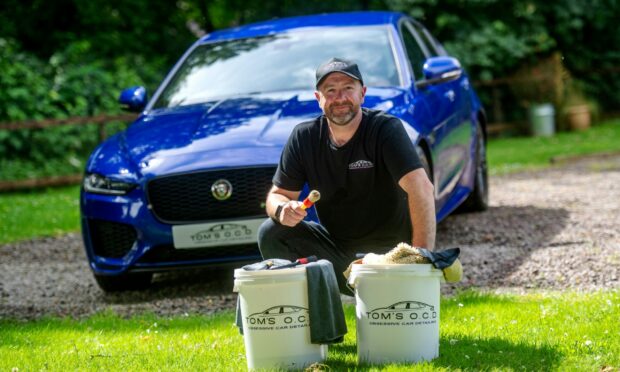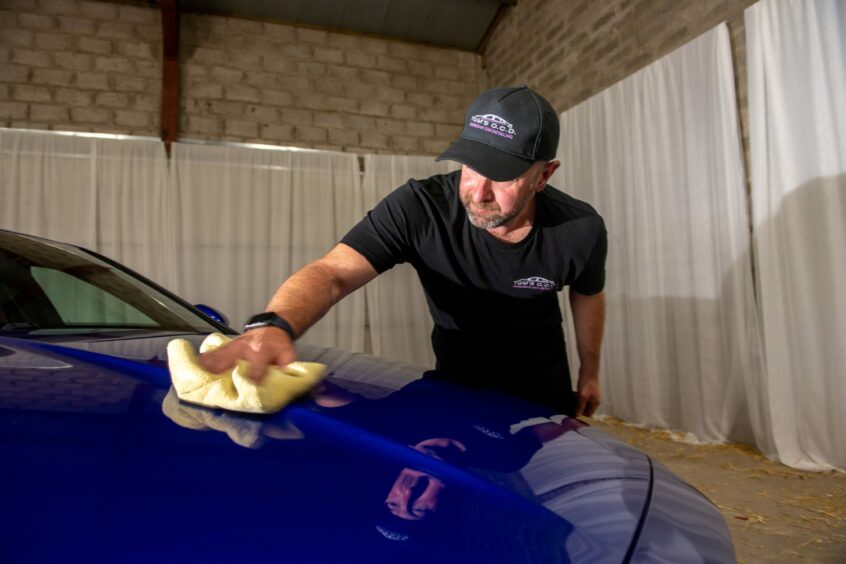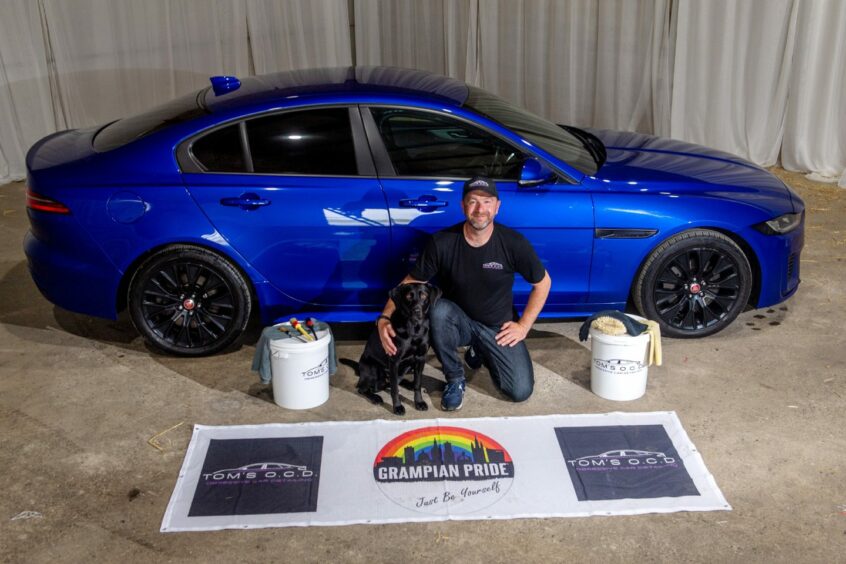New entrepreneur Tom May is loving life as a small business owner doing what comes naturally for many obsessive compulsive disorder (OCD) sufferers like him.
He launched vehicle detailing service Toms OCD, which in this case also stands for Obsessive Car Detailing, earlier this year and relishes every job.
Keeping customers’ cars and vans spotlessly clean is perfect for his instinctive need to tidy. And incorporating “OCD” into the company name helps raise awareness of the disorder, he said.
Distress over a messy bedroom was early sign of OCD
The 42-year-old from Logie Newton, near Rothienorman, Aberdeenshire, was in the RAF when it was confirmed he had OCD. His obsession for cleanliness meant he couldn’t go to bed until “everything was perfect”.
But he suspected something wasn’t right much earlier in life.
The Aberdonian explained: “I can remember from a very young age one night where I couldn’t sleep and was very distressed. For a child this isn’t unusual, I suppose, but my reason was that my bedroom was a mess after a friend came over to play. Toys were everywhere.
Louder for the people in the back 💗 #OneMillionStepsForOCD @iocdf pic.twitter.com/jr5D9eaITG
— Obsessively OCD (@obsessivelyocd) October 23, 2021
“I was told to go to bed and get to sleep, but I couldn’t. My mind was racing and I couldn’t settle. My parents came to my room and asked why I was so upset. They calmed me and helped sort my room so I could sleep. This was my first encounter with what has developed over the years into mild obsessive compulsive disorder.
“Also at a young age I found a love for cleaning, mostly cars. It wasn’t unusual for me to clean and tidy at family members’ homes when visiting. I’ve a very fond memory of finally being trusted to clean my dad’s pristine F Reg Ford Orion and get some polish on it. As soon as I learnt to drive people realised I love to clean cars – my own, my family’s and my colleagues’.
He continued: “I joined the armed forces and this was great for me, with the discipline that was enforced to keep standards high. Eventually, I was posted to RAF Kinloss, working in the aviation fuels department. I made some amazing lifelong friends there.
“Once the work was done on a Friday I would head out to the car park and clean cars, the deal being I could do my own if I did others. So I did. One by one, week after week.”
An act of chivalry? No, I just didn’t want her fingerprints all over the car
Mr May said he was once mistaken for being chivalrous when he opened the car door for a woman on a first date. “There was no way she was putting fingerprints on the car I’d spent all day polishing,” he explained.
“My OCD, possibly like many others’, manifests in unusual ways. There are things that would drive others mad that I couldn’t care about – but some things just can’t be left.
“I had the idea years ago that I wanted to be an auto detailer and OCD was the first name I came up with.”
More than 12 years in oil and gas industry
On leaving the armed forces after nearly 13 years, he joined the oil and gas industry.
He had a variety of jobs in the sector from late 2011 to earlier this year.
The former Bankhead Academy pupil said: “Back in January I found myself out of work and taking some time for me. Friends approached me to clean their cars and even offered to pay. Their response to my workmanship sparked the drive to take the leap of faith and give my dream a go. Toms OCD Ltd was born.”
Mental health gets a lot of attention nowadays and so it should, but there is still a lot of negativity around the subject.”
Mr May revealed a few people had questioned his choice of business name.
He added: “It’s done with love and understanding and, as with most aspects of my life, a touch of humour.
“Mental health gets a lot of attention nowadays and so it should, but there is still a lot of negativity around the subject. A friend told me recently the way I look at my own mental health is positive and that it’s almost like I’ve found a superpower to use for good. This is what drives me to push the business further.”
What exactly is OCD?
“Obsessive-compulsive disorder is an anxiety disorder that causes people to experience a variety of symptoms that typically fall into one of two categories: ‘obsessions’ and ‘compulsions’,” explained Priory consultant psychiatrist Dr Paul McLaren.
He added: “Obsessions are characterised by persistent and irrational thoughts or urges, and compulsions refer to physical or mental acts that people feel compelled to perform.”
- Some people with OCD have only one type of symptom, while others experience both.
- Their “irrational” thoughts and behaviours can become very time-consuming, but they are impossible to stop or control.
- OCD is ranked by the World Health Organisation as one of the top 10 causes of mental illness-related disability.
- Common presentations include the compulsion to continually wash hands, double-checking and hoarding behaviour.


